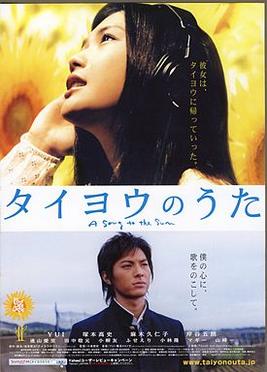A Song to the Sun
A Song to the Sun (Taiyō no Uta) is a Japanese drama film directed by Norihiro Koizumi in 2006. The film stars Yui, a popular Japanese singer-songwriter and actress, in her acting debut. It tells the story of Kaoru Amane, a 16-year-old girl suffering from Xeroderma Pigmentosum (XP), a rare skin condition that makes exposure to sunlight potentially lethal, forcing her to live her life nocturnally. Despite her condition, Kaoru possesses a deep passion for music, particularly playing her acoustic guitar and singing, which becomes a major theme throughout the film.
Plot[edit | edit source]
Kaoru Amane, played by Yui, lives a secluded life due to her condition, XP, which restricts her activities to the nighttime. Her world changes when she meets Koji Fujishiro, a high school student with a passion for surfing. The film explores their growing relationship, the challenges posed by Kaoru's illness, and her pursuit of her musical dreams despite her limitations.
Cast[edit | edit source]
- Yui as Kaoru Amane
- Takashi Tsukamoto as Koji Fujishiro
- Kuniko Asagi as Kaoru's mother
- Goro Kishitani as Kaoru's father
- Eri Fuse as Koji's mother
Themes[edit | edit source]
A Song to the Sun delves into themes of love, dreams, and the struggle against fate. Kaoru's condition, XP, serves as a metaphor for the barriers that individuals face in life, while her passion for music symbolizes the universal desire to express oneself and connect with others. The film also touches on the impact of chronic illness on family dynamics and personal relationships.
Reception[edit | edit source]
Upon its release, A Song to the Sun received positive reviews for its heartfelt storytelling, Yui's performance, and its music. The film's soundtrack, particularly the song "Good-bye Days," also performed by Yui, became a hit in Japan, further elevating the film's status among audiences.
Legacy[edit | edit source]
The film not only marked Yui's acting debut but also significantly boosted her music career. It has since inspired a manga adaptation and a television drama, spreading its influence beyond the realm of cinema. A Song to the Sun remains a beloved piece in Japan's filmography, celebrated for its poignant exploration of life, love, and the pursuit of one's dreams against all odds.
Search WikiMD
Ad.Tired of being Overweight? Try W8MD's physician weight loss program.
Semaglutide (Ozempic / Wegovy and Tirzepatide (Mounjaro / Zepbound) available.
Advertise on WikiMD
|
WikiMD's Wellness Encyclopedia |
| Let Food Be Thy Medicine Medicine Thy Food - Hippocrates |
Translate this page: - East Asian
中文,
日本,
한국어,
South Asian
हिन्दी,
தமிழ்,
తెలుగు,
Urdu,
ಕನ್ನಡ,
Southeast Asian
Indonesian,
Vietnamese,
Thai,
မြန်မာဘာသာ,
বাংলা
European
español,
Deutsch,
français,
Greek,
português do Brasil,
polski,
română,
русский,
Nederlands,
norsk,
svenska,
suomi,
Italian
Middle Eastern & African
عربى,
Turkish,
Persian,
Hebrew,
Afrikaans,
isiZulu,
Kiswahili,
Other
Bulgarian,
Hungarian,
Czech,
Swedish,
മലയാളം,
मराठी,
ਪੰਜਾਬੀ,
ગુજરાતી,
Portuguese,
Ukrainian
Medical Disclaimer: WikiMD is not a substitute for professional medical advice. The information on WikiMD is provided as an information resource only, may be incorrect, outdated or misleading, and is not to be used or relied on for any diagnostic or treatment purposes. Please consult your health care provider before making any healthcare decisions or for guidance about a specific medical condition. WikiMD expressly disclaims responsibility, and shall have no liability, for any damages, loss, injury, or liability whatsoever suffered as a result of your reliance on the information contained in this site. By visiting this site you agree to the foregoing terms and conditions, which may from time to time be changed or supplemented by WikiMD. If you do not agree to the foregoing terms and conditions, you should not enter or use this site. See full disclaimer.
Credits:Most images are courtesy of Wikimedia commons, and templates, categories Wikipedia, licensed under CC BY SA or similar.
Contributors: Prab R. Tumpati, MD

